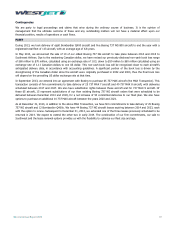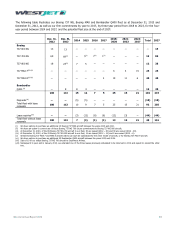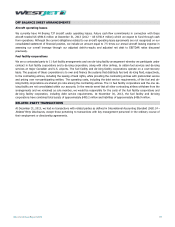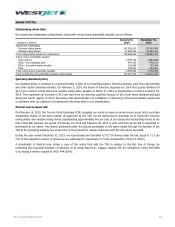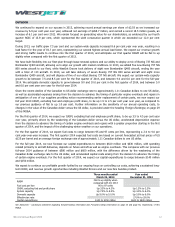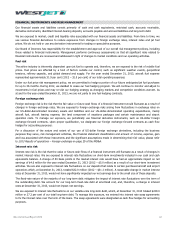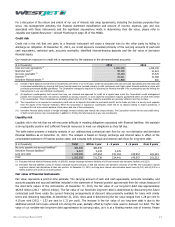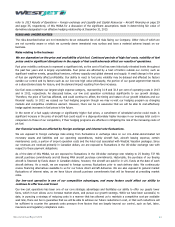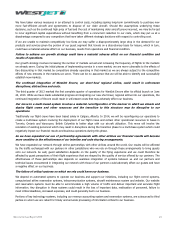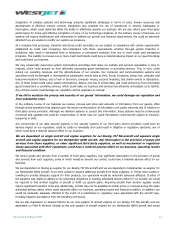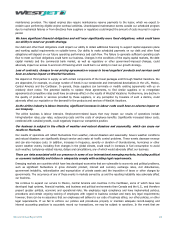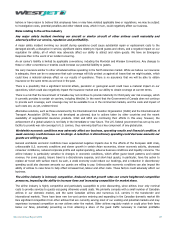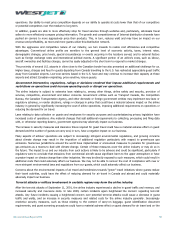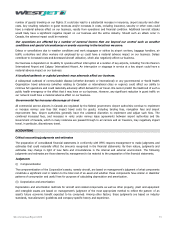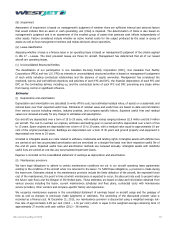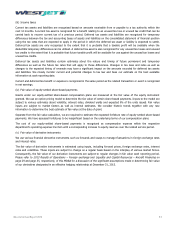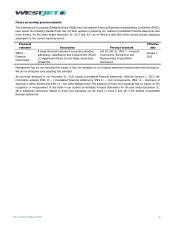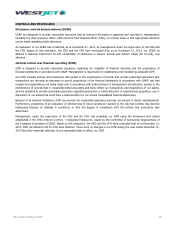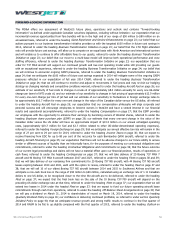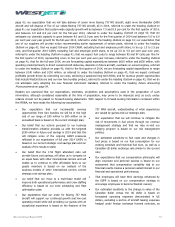Westjet 2013 Annual Report Download - page 47
Download and view the complete annual report
Please find page 47 of the 2013 Westjet annual report below. You can navigate through the pages in the report by either clicking on the pages listed below, or by using the keyword search tool below to find specific information within the annual report.
WestJet Annual Report 2013 47
therefore be materially adversely affected in the event of a mechanical or regulatory issue associated with our engines or if
either supplier was unable or unwilling to provide adequate support for their products.
Our ability to obtain parts, materials, inventory, consumables and services from third party vendors and outside service
providers on commercially reasonable terms will also impact our low cost operating structure and the loss of any such
suppliers or service providers may negatively impact our business.
Inability to retain key personnel could harm our business.
Our success will depend, in part, on the retention of management and key personnel. If any of these individuals become
unable to continue in their present role, we may have difficulty replacing these individuals, which could adversely affect our
business.
Our business is labour intensive and requires large numbers of pilots, flight attendants, mechanics, guest service and other
personnel. Our growth and general turnover requires us to locate, hire, train and retain a significant number of new
employees each year. There can be no assurance that we will be able to locate, hire, train and retain the qualified employees
that we need to meet our growth plans or replace departing employees. Our business would be adversely affected if we are
unable to hire and retain qualified employees at a reasonable cost.
A significant change in our unique corporate culture or guest experience could have adverse operational and
financial consequences.
Our strong corporate culture is one of our fundamental competitive advantages. We strive to maintain an innovative culture
where all employees are committed to, and passionately pursue, our values, mission and vision. We also foster a unique
culture of caring and compassion for our guests and fellow employees that sets us apart from our competitors. Failure to
maintain our unique corporate culture or guest experience could adversely affect our business.
We may be subject to unionization.
At present we have a non-union workforce which we believe gives us a competitive advantage and helps foster our unique
corporate culture. From time to time, certain groups of our employees have been subjected to unionization drives and may be
subjected to further unionization drives in the future that could result in these classes of employees having a collective voice
to bargain terms and conditions of employment outside of the scope of our existing recognized employee association.
While to date, no application for certification has been filed with the Canada Industrial Relations Board, the Canada Labour
Code provides that a union can be automatically certified where more than 50 per cent of a group of employees sign
membership cards. In the event an employee group were to unionize, we would be required to bargain in good faith with the
trade union regarding the implementation of a collective agreement.
We believe that our recognized employee association has, to date, been helpful in balancing the interests of the business with
those of WestJetters, by taking a pro-active approach to resolving issues and needs of WestJetters, while fostering the culture
and vision of the Company. Additionally we have a memorandum of agreement with our pilots under which we have agreed,
on a balance-of-interests basis, to certain work terms. We believe that this approach with our pilots, and potentially with our
flight attendants, buttresses the important work undertaken by our employee association. If we run into difficulties in coming
to mutually acceptable terms under these memoranda of agreement from time to time, a union could see this as an
opportunity to undermine our work and attempt to organize. Unionization could fundamentally change the dynamic of our
relationship with our employees and result in demands that adversely affect our financial condition and a collective agreement
could materially impact many facets of how we run our business. In addition, the introduction of a unionized workforce may
diminish our employee-friendly corporate culture and reputation. If unionization occurs and we cannot agree to the terms of a
collective agreement (and we exhaust the dispute resolution processes available under the Canada Labour Code) we may be
subject to work stoppages which would be harmful to our business.
Our maintenance costs will increase as our fleet ages.
The average age of our fleet at December 31, 2013, was 6.8 years. Our maintenance costs will increase as our fleet ages and
warranties expire. Since we began acquiring our Boeing 737 NG aircraft, 86 aircraft have come off warranty, with an
additional 5 coming off warranty in 2014. Our repair and maintenance program includes overhauls to engines, landing gear
and airframes in addition to ongoing maintenance requirements. Overhaul costs on owned components are separately
capitalized and amortized over the period until the next overhaul. Overhaul costs on leased components are accrued for in our


